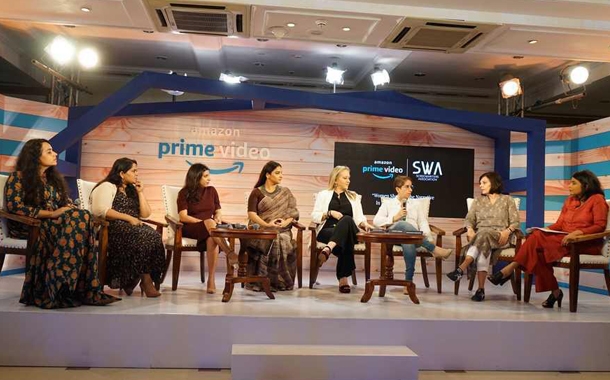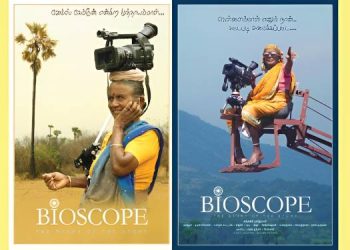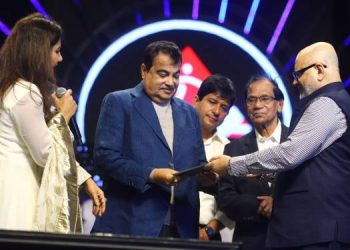The following are the key excerpts from the Panel Discussion on “Women shaping the narrative in Media and Entertainment” organised by Amazon Prime Video and Screenwriters Association that took place on March 8:
Jennifer Salke, Head Of Amazon Studios (Worldwide)
On female representation:
The situation is changing every day. Again, it is about being intentional about looking at a full list of male and female directors when you’re making selections. I have a great example of just being in Sundance and we bought five movies there. I think four of those movies were directed by women but that was never a conversation. The more women are given a chance to tell stories, it creates momentum moving forward and you do see change.
Gazal Dhaliwal, Writer
On female representation:
When you don’t see representation, it is important to call it out so that there is awareness about it, there’s information about it. I’ve had experiences where directors have actually said to me that ‘I don’t think you can write it because it’s a man’s story and you won’t be able to give it voice. We can write any sorts of stories. In fact, looking at men from a female gaze is also equally important as looking at them from a male gaze. In fact I like to think that in our stories, in our films, we can at least get the men that we think we deserve.
On the kind of women centric stories that are being told:
I don’t think there’s enough. Far from enough. You know that the theme for this year’s women’s day is ‘Balance for Better’. Only when there’s balance between male and female perspectives, male and female gazes, will the world be better. And I think that we don’t have enough female writers and that’s problematic because we are not getting to see enough stories which need to get told. And the reason we need to do this is because that small town girl can look at them as role models and say I can do that as well. It’s important to reinforce that.
Sumukhi Suresh, Writer, Stand-Up Comedian
On being a woman in a man’s world:
I understand the point of why the narrative is being pushed because it gives out the point of ‘oh the women are being pushed forward and that also many women can come forward.’ But it also very subconsciously pits women against each other. It will always be me against another female comedian. I will never be the best in the craft – I will be the best in my gender and that is unfair to the craft and to me. It’s limiting.
On the gender conversation being completely female:
At this stage right now, maybe it is the time for us to be heard and for them to listen. And I’m sure there’s going to be a point where we have to hear. Right now is the time for them to listen. And I think that men in India and overall can do that.
Vidya Balan, Actor
On creating opportunities for women:
I believe we need to create more opportunities. History has shown us that there aren’t too many examples because of a lack of opportunity. Therefore, if you open up opportunity only then we will know how many women are capable, talented and have a chance of making it and doing well. That slight push is essential and then of course your work will speak for itself. But you have to open up that window. The opportunities have to be made available. Of course it has to be merit based.
On getting more stories based on women:
In the last ten years I cannot even begin to tell you the range of subjects that have been offered to me with me at the center of the story. The canvass has opened up but there are lots of factors guiding this. Commercial viability is important. Over the decades we have had female centric films and we’ve had the success stories but they’ve been in fits and spurts. For this to continue, for this to not be a phase, we need for them to be commercially viable.
On themes that are being explored and how most center around a woman’s sexuality:
I tend to agree based on the content that’s out there and maybe that’s because it gives you a rush of freedom – whether it’s your body or your sexuality. We start there and then it probably moves inwards. The kind of conversations a show like Four More Shots Please as sparked – in my make-up van, we were taking about women masturbating and that’s just never happened before. I think it’s nice to be putting it out there. What it does is, it frees something in you. It will excite all kinds of viewers. And if sex, or a woman using her body brings you to the theatre I am happy because only then will you know her story. To get to the next layer, the body is the starting point.
On the gender conversation being completely female:
We have not had a voice for very long. We have only begun to express ourselves. So it’s not that this is not for men or not going to include men, because we want to express ourselves as much. And I am sure men are listening. And I am sure every man wants to listen to what we have to say. I hope every woman is also listening. Often we women are products of that conditioning that sexism, that’s deeply ingrained in us.
Zoya Akhtar, Writer-Director-Producer
On women driven stories:
I think there have been female driven stories in every decade. They’ve just not been continuous and tend to forget them.
On themes that are being explored and how most center around a woman’s sexuality:
Owning our bodies – that hasn’t existed! While I was growing up I have only seen physical abuse on the screen. We were allowed to see rape scenes and molestation and assault but we weren’t allowed to see consensual sex. And that has to impact the way men and women look at what sex is. Because we do not watch people kissing, we do not watch tenderness, we do not watch people making love, we do not see how people want to be treated. What you’re putting out there is women always saying no and you should just jump on them. You need to see interaction and how it’s meant to be.
On changing the way intimacy is showcased on screen:
It’s changing palates, changing tastes, exposure, satellite television, digital platforms, exposure to global changes, the internet, the conversation changing. Also this is the first time money is chasing content. We have always said that artists have to chase money. It’s flipped now. And that is power. Now you have platforms that are coming from completely global headspaces.
Guneet Monga, Producer
On themes that are being explored and how most center around a woman’s sexuality:
We just won an Oscar for a short film on menstruation. Normalizing that conversation, with women at the center and women’s revolution at the center, there’s a revolution happening in the film and around it and outside it. I think it is the authenticity of the story you tell, the way you tell that story and the global platforms such as Amazon and Netflix allow us to do that.
On the gender conversation being completely female:
We cannot take away the fact that for so many years, there has been suppression. We lacked opportunity and hence this conversation. It’s about holding each other’s hand because there is enough for everyone. An empowered woman empowers another woman.

















